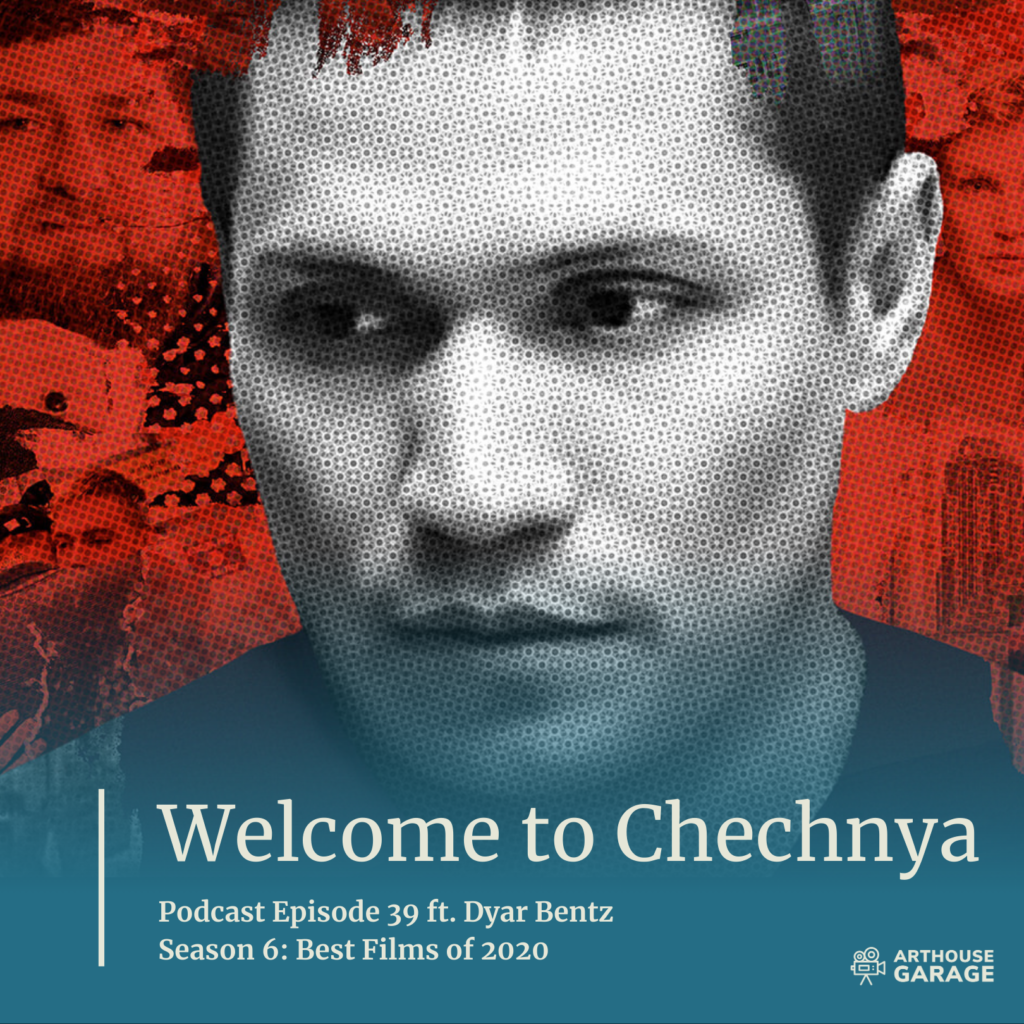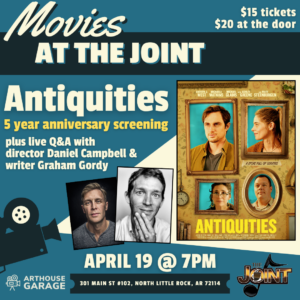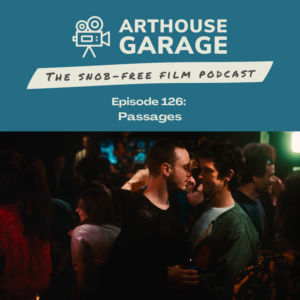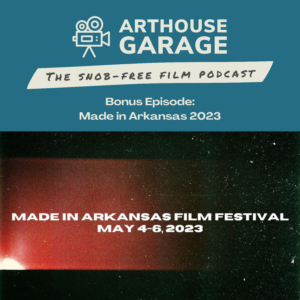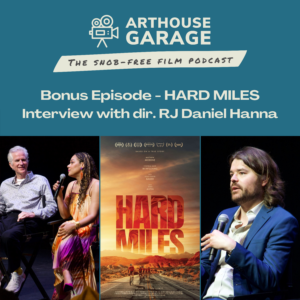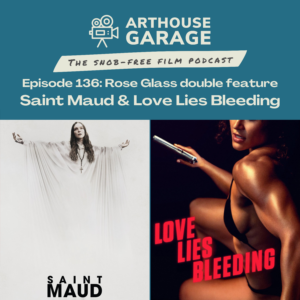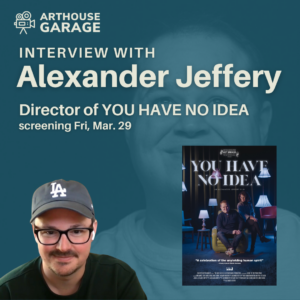Read the transcript below:
Andrew Sweatman 0:00
Hello, just before the episode gets started, I wanted to issue a quick trigger warning. We discuss a film called Welcome to Chechnya, which is about violence against people in the LGBTQ plus community that is occurring in Chechnya. It’s a heavy subject matter. And what we don’t go into detail about anything violent in our discussion, we do talk about the emotional and physical abuse that people are experiencing in that part of the world. I want to encourage you to listen only if you feel ready for that. Thanks.
Hello, hello, and welcome back to art house garage, this knob free film Podcast, where we make Parkhouse indie classic and foreign cinema accessible to the masses. I’m your host Andrew sweat Minh and we are looking at some of the best films of 2020 for this season of the podcast. on previous episodes, we’ve talked about films like in the assistant and Dick Johnson is dead. And in upcoming episodes, we’ll look at Nomad land mank one night in Miami and many more. Today’s film is welcome to Chechnya, a powerful new documentary about the danger facing the LGBTQ plus community in that part of the world. Basically, the Chechen government and police are right now today capturing and torturing people in Chechnya because of their sexual orientation. This film details what’s going on there. And it follows a group of activists as they work to rescue people from the country. It’s honestly pretty astounding, just how how bad things are. And the filmmakers here have captured some incredible footage of the situation. They’re not only of the horse, but also of the human moments as these people who are in hiding, expressed their fears and their hopes, we see tragic moments of leaving family behind some beautiful moments of being reunited with family members. It’s really a powerful documentary. It’s streaming now on HBO Max, and I highly recommend that you watch it. In this podcast, we do spoil one thing that happens near the end of the film. I don’t think it would affect your experience of the film too much if you listen to this podcast first. And it’s also something you could read about in the news of the last few years. But still, you may want to watch the film first, or just tune out of the podcast at that point in our conversation. Joining me today to talk about Welcome to Chechnya is a very special guest, my friend and filmmaker Dyer, Vince Dyer is actually my childhood best friend. from kindergarten through about second or third grade, I think we were best friends. But then our families moved away from each other. And we basically lost touch until just a few years ago. We reconnected through Facebook. He was able to visit my family here in Arkansas last year, and meet my kids and my wife. And I learned at that point that he too is a lover of cinema. And he spent many years working on film and photography projects. I knew I had to get him on the podcast sometime not only to talk movies, but to talk about his movies, including what we are going to talk about in just a second. His exciting new travel documentary called pedal south. So we’ll get into that. Welcome to the podcast. I obinze. How are you today?
Dyar Bentz 3:04
Howdy man. I’m doing all right. I’ve had a pretty fantastic week, even despite literally falling through a ceiling The other day
Andrew Sweatman 3:14
you fell through a ceiling.
Unknown Speaker 3:16
I was getting a I was getting a dead possum out of an attic. And I like put too much weight on the drywall. And I literally like the cartoons fell through the ceiling into the kitchen of my upstairs neighbor’s home. It was absurd. Totally fine. Not a scratch but my home. I’m humbled and aware of mortality in a good way.
Andrew Sweatman 3:43
There you go. You know that weirdly might be a good segue into talking about your film project. So before we talk about Welcome to Chechnya, I would love to hear a little bit about your project, which is called pedal south. So tell us what is pedal South? And how did you create it? Totally.
Unknown Speaker 4:00
So pedal South is a project long in the making. back right around? Let’s see, in college, I did some kind of long distance bike rides through charity thing and through some other stuff and really just got into that world. And one of my favorite aspects of doing like long distance cycling, or also called touring cycle touring, is where you’re carrying all your stuff and you’re getting yourself from place to place and it’s just the absolute best way in the world to meet people, strangers who immediately they ask you, you know, like where did you Where’d you come from, and holy cow and then they just want to talk and talk and share their world with you and often invite you into their home and, and that goes anywhere in the world. You show up on a bike with all your stuff strapped on there and people are down to talk. So that got me just excited about the idea of, of storytelling from the bike. And so some other filmmaker friends and I In college, we just decided to go big and figure out what is the longest route we could imagine. And bring along camera gear and cycle the entire thing and make a documentary, out of the experience just kind of sharing what life on the bike is like, and also just as a means of sharing the stories of the people of the America. And so we decided to the longest route we could find was Alaska to Argentina. So we took 21 months cycling that route, 14 countries 14,000 miles, and we were filming and capturing stories and our own journey the whole way.
Andrew Sweatman 5:42
That’s so remarkable. And so I’m lucky enough that I’ve seen a little preview of some of this footage. And it’s it’s really great. It’s I’m biased, obviously, because I know the person in the footage, but it’s like it’s part travelogue. It’s part of nature documentary feeling. And then it’s part this kind of Agnes Varda style, human storytelling, it’s really compelling. And I can’t wait to see the rest of it. As I was watching it, it’s gorgeously shot. So many questions popped in my head, like, are you guys gonna have conflict on the road amongst each other? Will you ever find yourselves in mortal danger? Will you die from exhaustion. And so I’m sure that once the rest of the series is released, that some of those questions will be answered. But maybe you can tell us just briefly, what are some of the challenges that you faced on the road for so long?
Unknown Speaker 6:29
Thank you, man. Yeah, I’m so we all have different roles, but everyone kind of partook in, in all the aspects of making the film I only shot a tiny bit. It’s mostly are incredible to cinematographers, who are to thank for how beautiful it looks. And that is kind of what shocks people the most who hear about our project and assume that we’re using GoPros. And then it’s all shaky and kind of low quality. It’s the cinematic aspect of it was hugely important to us. And that’s very apparent in the quality. And I know what it is, yeah, I’m excited for people to see that for sure. But yeah, but to to the adventure aspect. It was an adventure, and kind of the way I’ve really come to describe the word adventure is the number one factor that makes it an adventure is when there’s just ridiculous challenges, unforeseen ridiculous challenges, daily, you know, like constantly Yeah, and and that was the case for us. Yeah, we had, obviously, the dangers everyone imagines of being robbed, or just the harsh climate, camping outside all the time. But what most people don’t realize is that the number one most dangerous part of the entire thing was the potential of being hit by a vehicle. Every single day, we were, you know, there’s this, the Pan American highway, it’s called kind of a system of highways that goes all the way down the west coast of both continents. And plenty of times, there’s only one road. So every single semi anyone who needs to go through that area is zooming right, right alongside you. So that was the biggest danger. But yeah, the challenges of also just the team dynamics were, you know, any group of people going through a trying thing, are going to have some, some strife and struggles between them. And then you put, you put four creative minded people together and tell them to make a series or a film. And you know, we would butt heads constantly, because we all like had ideas of how it could be done better. And then just the logistics, and what a lot of people also what we’re trying to get across in this is that it is us filming, and us being the characters, there’s only four of us. And so there’s no film crew, and that’s what we really want to make apparent. The challenges of doing a bike ride around the world are compiled with the challenges of making a film of it. And so yeah, plenty of challenges. But that’s a lot of whining, which is all ridiculously surpassed by the beauty and and good parts of adventure that we got to experience. Yeah, every single day. So
Andrew Sweatman 9:19
yeah, absolutely. I mean, the shots of nature and the shots of just people’s faces, you got some great close ups into as I thought about like, well, you guys went like, I, for some reason, I didn’t think about Canada, like you went to Canada, so that you see people from Canada, and then all the way through South and Central America. And yeah, it’s, it’s I’m really excited to watch the rest of this. It’s really pretty cool. And I think, you know, don’t feel too bad about whining about I think so the challenges are are part of what makes it such an interesting thing. So because that’s baked into the story, I think that we’re gonna see once this is all released some Anyway, I’m really excited to watch it. How long are you planning for episodes to be how many episodes and then is there like a status of like, what’s the next step? for releasing it and all that,
Unknown Speaker 10:01
for sure, we gathered over 1000 hours of footage during the actual filming of it, you know, almost two years on the road, there’s a lot to film. And it took us literally two years just to go through everything. And we’ve been working on it ourselves and posts since then. We’re in the process now of actually working on individual episodes. This is all kind of to be determined in detail by our show, essentially, it’s gonna we’re looking at a miniseries style documentary. So anywhere from anywhere, somewhere around six episodes of maybe a dramatic show length, so 45 to an hour. And that’s, that’s where we’re at right now.
Andrew Sweatman 10:47
Well, that’s really exciting. That is pedal south. I can’t wait to watch the rest of this. I’ll make sure to share it out on social media whenever there are updates and news about it. Because definitely one that I’m going to be watching so yeah, thanks for thanks for making pedal south. I’m excited to see it.
Unknown Speaker 11:02
No doubt. Well, alright, now
Andrew Sweatman 11:04
let’s get into our discussion of Welcome to Chechnya.
Unknown Speaker 11:12
Excuse me, let’s go quickly Cretaceous to us.
Unknown Speaker 11:19
So for me
Unknown Speaker 11:29
when I say appreciate the reception is to sneak
Unknown Speaker 11:33
masteries
Unknown Speaker 11:40
wisdom Stan’s experience he thought
Unknown Speaker 11:47
I wanted to ask you about the alleged abduction and torture of gay men in the Republic
Unknown Speaker 11:53
at the Uganda
Unknown Speaker 11:56
that’s the case what they do so
Andrew Sweatman 12:01
alright, let’s talk about Welcome to Chechnya. So this is a sobering and harrowing look from filmmaker David France, at the experience of members of the LGBT community, living in Chechnya, and the extreme persecution they’re facing. So gay people in Chechnya live in fear for their lives. Since 2017, especially, many have been tortured or killed at the hands of Chechen police, and government officials. So this documentary is shining a light on these atrocities that are happening right now. And then follows a group of LGBT activists as they rescue people, and help them relocate in other countries as refugees. So it’s makes for a viewing experience that’s very intense. It’s quite heavy, at times really emotional, but also really thrilling and nerve racking. And it’s a good cinema, but it’s also clearly doing shining light on something that’s really important and kind of doing a good thing in the world. So there’s a lot there. But I thought I might first ask you Dyer as a documentary filmmaker, about the production of this, and kind of your impression? How effective Did you find the storytelling here? Especially with regards to like the shooting and editing of it?
Unknown Speaker 13:09
Yeah, there’s so much I can say in response to that question. As far as, you know, bringing just my own very minimal relative experience and documentary to this response. doing a project like this in which not only your own life is at stake, but the lives of others and as you see in the film, their entire families. It’s it, I’m just like, shaking in the corner, thinking about it, and to imagine all the unbelievable work that went into the making of this film, some of which is evident in the movie itself. But a majority of a majority of it that you know, the audience won’t even be aware of. It’s it just baffles me. It’s incredible. And yeah, I think it’s so to the to the question of was it effective? I think pretty ridiculously so. So the first thing I you know, the most striking part of this movie is these, these real footage, both You know, sometimes there’s footage of kind of cell phone video of terrible acts occurring to people that was posted by the perpetrators of of the incidents, which is hard to fathom.
Andrew Sweatman 14:33
Yeah, it’s it’s interesting how it It cuts in and says, you know, this video is intercepted by LGBT activists and then it’ll show this Yeah, this horrifying clip of something happening. Yeah, go on.
Unknown Speaker 14:43
And so point being so those videos and also the footage the crew gathered themselves have have kind of underground railroad style rescues of people. That footage as well. It’s just it’s so harrowing to manage. How it was shot and how they did it. Anyways, and so some, you know, documentaries these days, especially ones that are a little more abstract or don’t have footage of stuff going down in the moment, we’ll get creative and use animations or something to tell the story. But this requires no creative storytelling. What it requires is just like honoring the unbelievable footage that they they gathered and source. And so I think it does a really good job of keeping it extremely simple and straightforward. And like well edited, super smooth storylines. I think the way they the the number of characters they like main characters they explored was perfectly done. And they also intro them really smoothly, someone would come in early as a, you might think they’re tertiary, and just helping out on the side. And then of course, just by anyone who’s wrapped up in this, their life is in danger as well
Andrew Sweatman 16:02
effect and
Unknown Speaker 16:03
so you have a tertiary character, who then has to escape the end of the film. And so I felt like I constantly was there. Never confused, always aware of the subject. And the pacing was perfect. Yeah, I thought it was just very well done.
Andrew Sweatman 16:20
Yeah, I completely agree. I was really taken with this in a way that yeah, it’s it’s so harrowing, and, like, emotionally troubling, you know. And that’s, that’s the point of it. But it’s, yeah, I thought it was really, really well done. And so much of it was filmed in secret, I think that’s an interesting thing. So a lot of that cameras were hidden. And you can kind of tell in the footage, especially I was like, you know, it’s a policeman looking at someone’s passport or something. And you’re just holding your breath to see how they’re going to get through this checkpoint. On their way out. I read an article about the making of this on documentary.org. And I’ll link that in the show notes. But it talks about some of the cameras they used. A lot of this was like camera jargon that’s over my head, because I’m not a filmmaker. But then they also talked about using iPhones and GoPros for a lot of it, and the director want it to all be in 4k. And so they use you know, iPhones can do that now. And there was an interesting quote from one of the camera people Alexandra, Ivan Nova. And she talked about that decision. And she said, here’s the quote, I decided not to use any special equipment or hidden cameras. For example, for example, a camera on your eyeglasses. In Russia, this equipment needs certain certifications and permissions. Without them you could be considered a spy and FaceTime in prison. So I thought that was really interesting that even the camera choices were affected by kind of safety concerns. And it’s like, I think in pedal south and your project, I saw some of those kind of AI cameras at one point so they were limited even in in what equipment they could use. I thought that was a just an interesting touched all of this.
Unknown Speaker 17:53
So interesting. So interesting. I yeah, I read the articles you sent as well. And like going into the details of their filmmaking setup is unbelievable. Like they is so much preparation of, they said they you know, beat up the kind of consumer level camera, the best camera they use in the whole film is just a little handycam tourist thing. And they purposefully kind of roughed it up put tape on it and made it look like a toy or something. And then just yeah, using using an iPhone to control the the cameras operation, while holding the camera under his armpit, and just turning his body like it’s awesome. I mean, I knew like that scene, you just describing that scene of the of the Border Patrol or whatever you’d call them, checking the passport. Like I’m, I’m like shaking thinking about it. That is the most tense thing I’ve seen in so long. And, and and you’re just thinking like, you’re you’re shaking for for the subject, of course, her life is at stake, but also as a cameraman, as I definitely have filmed in a few situations that I would call scary or hairy in which you need to just be on your toes, be aware. And you know, maybe realize you need to conceal your camera for any number of reasons. And it is it’s like it’s really frightening. But I’ve never been in a situation like that. Oh, my goodness. Yeah,
Andrew Sweatman 19:17
yeah, it’s kind of off the scale of incredible footage. And in your course that you mentioned that, that that footage of of atrocities happening that that it cuts in I think that helps that helps to set up the stakes. So well, in case you thought these people were exaggerating, like No, you’ve seen horrible things happening. And so you know, kind of what’s at stake as you’re watching these things. It’s really interesting. Another fascinating aspect of this is the way they disguise the identities of the subjects. So many of these people needed to remain anonymous, but instead of like blurring their faces out, the director decided to use like an AI basically like a deep fake kind of thing that we see on social media and several like an Irishman last year, kind of that facial masking, but he does it in a way that That actually filmed other people’s faces kind of going through the same emotions. And then yeah, ai matched it on. But it also was done in a way where there’s a little bit of a blurry edge around it, it explains this at the beginning of the film that what they’re doing. And it’s so you can tell I think it’s interesting, you can tell who is under this veil and who is not you but at the same time, it kind of you can still see the emotion their faces. So yeah, I thought was a really interesting technique, what was your impression of that kind of face blurring.
Unknown Speaker 20:31
It’s definitely one of the most fascinating parts of the whole film, both like the technology of how they did it is incredible. But also, to me, the the, like, metaphorical effect, is just like, outstanding, like I’m all about, in any medium, in any artistic medium, like anything that like stretches the bounds of that medium in particular, you know, it means that that is how the story is supposed to be told. And like, you know, if you think of this movie, be you know, as a book or something or just being done five years ago, you know, I don’t I don’t know how recent that technology is, I’m sure it’s, you know, improving every month or whatever, right. But if you imagine this movie with completely, like, blacked out figures and the dark rooms with a distorted FBI voice, or, or with just a complete blurring over their face, I mean, it I don’t think it would work half as well different. The the ability to have a real face there and see their actual emotions, both both the horrendous, like despairing ones, but also the beautiful, like intimate little moments of love and happiness throughout this. Just it made the whole film work. Like, it was incredible. And so, you know, that was the coolest part, the You didn’t even have to suspend your disbelief to be there emotionally. But also, you know, I had an interesting thought about this. And I’m glad you sent that article about the specifics of this tech, because I was wondering, like, I imagine, you know, just like the Scorsese picture, you mentioned it’s almost indistinguishable, this this effect when they really spend enough time and money on it. And so, you know, I I only assume the technology will get better and better. And maybe it’s already to the point where it wouldn’t even be noticeable. And I am glad that either through limitation or their decision. It was noticeable in this because the effect of like, knowing that it wasn’t their actual face. Yeah, was so interesting, both like, I mean, like thematically it’s, you know, it, it, it just plays into this idea that these people literally cannot show their actual selves in public. You know what I mean? Like this?
Andrew Sweatman 22:53
Yeah. If you identify who has a target on their back, yeah,
Unknown Speaker 22:56
right. These are the shadow people like, these are the people who cannot literally be themselves. It just, it’s so perfect for the story. And then just that subtle haze of it was just, it’s so eerie and like mystifying. And so yeah, I just thought was fascinating. And I liked in one of those articles, it said that, for the first number of shots of anyone who had that effect on they actually dialed up the power of it, to make it more apparent that it was a fake face. Because after a while, you might forget and you just become used to that character. And so yeah, I thought it was thought was incredible and what enabled this film to work, and in my opinion, like empowered it and made it even better, so
Andrew Sweatman 23:40
absolutely agree and, and so there’s actually an interesting moment, which we’ll talk about in a minute. That’s I guess, a mild spoiler where it it kind of plays with that idea to have you know, when the veil is there and when it’s not. So kind of along those lines. Let’s talk about a couple of the characters a couple of the most memorable storylines here. I think those are character Anya and Grecia. These are not their real names because they’re again in hiding but Anya story, this is the opening of the film we see this activist character who he does a lot of the storytelling in like talking heads up this film too, but he answers a phone call. And to kind of briefly tell on your story, shits Anya and she says that her uncle has found out that she’s gay, and that he’s threatening her basically threatening to out her unless she performed sexual favors for him. So she can immediately feel the stakes of what situation what horrible situation she’s in. And, and then you see him jump in action and say, All right, we’re gonna we’re gonna help you like we’re gonna figure this out. And then we kind of go back and learn the background before we get back to her story. And then we watch the process of of trying to rescue her. And it’s really interesting so she, they end up meeting with her at like a McDonald’s and they have this whole cover story. And she’s the one who’s you know, going to the airport. And it’s those those really harrowing moments, but I thought it was interesting to kind of build this the main structure of the movie sort of around her story. So what did you think of that? And what did you think about on your story?
Unknown Speaker 25:14
Yes. I think another example of just how great of storytellers, this director and whoever involved was for this project. Not only is this just like, such a cut and clear, dry example of the horrors of this situation for so many individuals, it also it gives you the, you know, that’s the what, and you know, the Why is pretty apparent, but the how of like, how are they what are they going to do about it and, and so, you, you get an example of the situation so clearly laid out, but then some, some movie action of like, we have to rescue this person. And so not only is her story now, you know, at the forefront, but all these people on camera, risking their own lives and safety, to go and help a total stranger. It just, it was perfect. It’s such a good way to bring in the audience, like get them engaged with the character, get them aware of the situation through a personal story. It just, it’s so gripping. And it’s it’s showing not telling to the extreme. I thought it was awesome. And I just want to mention, like, I think, you know, her story is, you know, one example of what many people faced, which is such a horrifying thing to me. You know, I feel like so many times, when, when a film, like especially a narrative film, it kind of it shows you visuals of your worst fears imagined. But when you watch a documentary, which shows you fears like beyond what you could comprehend, and so for me, the most horrifying part of this entire thing was this notion that the government is like, changing the culture and, and turning families against their own family members. Like it’s not it’s not even the like ultimate horror we all imagine of like, like uniformed, you know, soldiers storming your home, it’s your own family members being brainwashed to, to commit murder for a choice to
Andrew Sweatman 27:18
Oh, it’s.
Unknown Speaker 27:20
And so yeah, to see a personal story of that happening and to see like, the bravery of that character needing to escape it, it just it hammers in from the start of the movie. how serious this is. Yeah,
Andrew Sweatman 27:32
absolutely. Yeah, I thought it was a great, great way to open it. And I think you’re right, so so I guess we should explain a little more context. people haven’t seen this, but the judging government is, is on basically a crusade to quote unquote, cleanse their culture of gay people. And then that’s why people are such in hiding. And so you’re you’re alluding to dire there is that the one of the tactics they’re using is Yeah, convincing family members to discreetly kill their gay family members. And, and that’s what Anya is fearing from her own father. So yeah, it’s it’s absolutely horrifying. And yeah, and that’s, that’s where this movie starts. So it’s definitely an intense watch for that reason.
Unknown Speaker 28:18
Oh, yeah. It’s it’s like it’s, it’s, they’re making the they’re forcing you to fathom the unfathomable thing with this. Yeah. With this subject to this topic that’s happening right now. In the world.
Andrew Sweatman 28:31
Yeah. Which that actually is a good point to bring up that like, we can affect change in this way. If you go to the Welcome to Chechnya website, which I’ll link, it says, here’s where you can donate to the help in this. And so there are ways you can actually take action on this. One of the other stories that it tells is of Grecia, when again, that’s not his real name, but we meet him and then basically, the the activists talk about the importance of someone going public about the torture that they’ve been through. So there are basically people being captured and tortured and often killed. And very few people, you know, leave the torture chambers, but Grecia did because he was not born in Chechnya that they released him and then later regretted releasing him. But as the story goes on, you find out he’s he’s going to go public, he’s going to tell a story to the press, and they talk about the significance of that, and he’s going to try to challenge it in court. They’re in Chechnya, and are actually in Moscow, I guess, in Russia. Greater Russia, but. So this again, this is kind of getting to spoiling the movie a little bit. But I mean, you can look this up on the news. So not too concerned about it. But there, there is a moment where we’re watching him with his veiled face. And he goes before this, this huge room of press and just before he starts talking, there’s this close up, and then the veil lifts off his face. So I wanted to talk about that moment. And we see his real face for the first time and then we learn his real name. How, what was your impression of that moment?
Unknown Speaker 30:08
You know, I feel like less than less than five times in my life if I actually like had a jaw dropping experience during a film, you know what I mean? And that is one of them easily. I mean, gasping, like, it is so powerful the effect like how I mean, you realize the true danger, you you realize how how genuinely effective this technology was, because it looks like a completely different person. And you and it’s just, you’re just caught up in it is overwhelming is such an incredible move by them. Yeah, I thought it worked. I thought it worked very well.
Andrew Sweatman 30:48
Yeah, it was such an interesting moment, too, because I, when I realized, oh, we’re about to see his real face. Actually, before he was before they unveiled him, I thought. So I mean, all these people have their cameras pointed him right now I can go look him up on the internet, right, and figure out who this really is. And then as I hope they’re gonna show us, and then I was like, Well, why didn’t they just show us from the beginning and they kind of going through all this mentally as I was watching. But then I realized there is such a power in the act of unveiling and and we understand the stakes, and we’re kind of put into his shoes at that moment of like, he’s been secretive. He’s been hiding, how vulnerable he’s making himself at this moment. And and, yeah, it’s really breathtaking moment.
Unknown Speaker 31:26
It really is. And like I, for anyone who, you know, even listening to this podcast, who has not watched the film yet, I know, it sounds like a drag. I know, it sounds really difficult to watch. But what it is, like, undoubtedly, it is hard to watch. But this character story is one of one of quite a few, I would say but I’d say more than anyone else, this character, like you get to be so you get to become so intimate with him. You really see his entire progress through this journey. And, and I’m, like, choking up thinking about it right now. But he gets he is like, he is a hero. He’s a real life here. Undoubtedly. And men, you know, that’s like said to him in the film a few times, and it’s so powerful. But um, but this is another example to me of how effective this filmmaker was. And speaking, as someone who has done some, like intimate documentary work, you can’t do this stuff, unless you get the trust of your subjects. And like, often, often that requires, you know, time and like experience with them and bonding. And there are moments where it’s so evident that these filmmakers, both the, you know, the camera operators and the director have really gained the trust of all of them, but especially this character, because he’s just like, opening his heart to the camera. And there’s these little incredibly happy, beautiful moments of him like reuniting with his boyfriend and whatnot that, like, they make this whole thing just infinitely worth the difficulty of watching it. So to me, it just speaks to like, the power of this actual human in the world, the subject, and also the filmmaker and and the the success they’ve had in like, becoming trusted and intimate with their with their subjects.
Andrew Sweatman 33:28
Yeah, I completely agree. And I think, yes, so we should mention, like, yeah, this is a heavy movie, but there are those moments of joy in it. I think that’s important, like that moment when he’s reunited with his partner and his whole family. So his whole family has to relocate. And we even have learned now, in the past, it was difficult for his mother to accept him. But then once she did, she was like, all in and like, we’re gonna move to like, and realize that she was not only because they’re in danger, because they’re supporting him in this way. So yeah, it’s really moving and it’s in it’s showing real people going through this stuff. Yeah, that is that is welcome to Chechnya. It feels like a significant film. It sounds like we both recommend it pretty strongly. That is now streaming on HBO. Max, if you’re in the United States, I’ll link to you again to welcome to Chechens website, where they have some other information about if you want to be involved in this and yeah, any any final thoughts on it Dyer.
Unknown Speaker 34:20
I’m just like, it’s amazing. My field of my whole body how affected I was by again, like it’s just coming up thinking of the specific moments. Yeah, I’m glad that I watched it. And it’s, you know, it’s a good reminder that every once in a while you just like, you need to watch something that’s like challenging and real and tough. And often it’s rewarding, even in happy ways.
Andrew Sweatman 34:42
Yeah, I think that’s a good final. One other thing actually did want to mention too, is that it part of the strategy is, you know, we have to get these people out, they’re going to be refugees. Now, they have to find a country that will. They’re they’re seeking asylum that will grant asylum to them. and Canada has taken several and what that means ends with a message that the Trump administration has not accepted anyone, which is not surprising. But it was very interesting to watch this, like, you know, shortly after this election has been called and looking to a hopeful, a more hopeful future with it. Because the documentary definitely ends and in the light of like, they’re there so much that needs to be done to fix this problem. And it’s, it’s very much ongoing, without, you know, a hugely hopeful ending, really, but it was like that glimmer of hope and that, you know, at least maybe the United States can can become even even a little bit involved in helping to solve this crisis would
Unknown Speaker 35:36
be a great thing. No, to just comment on what you just said, it’s so true. In so many ways, like, I think everyone, on whatever side you are, has been so preoccupied in the US with the goings on in the US that I think a lot of us even those who attempt to be educated about what’s going on in the rest of the world. I feel like it’s been pretty impossible for the past four years, or to some degree. And so it is such it’s such a good time for us to remember and realize what else is going on out there. And that we can actually affect change to help it both as an individual by going to the website you mentioned, welcome to techyv.com. But also, yeah, as a country like what what is our future like? are we about to become a force of good or attempt to? Yeah, what’s going to happen? And I think it’s time for us to start empathizing, reaching out and looking outward again.
Andrew Sweatman 36:35
Yeah. And as I was thinking about that, too, like, saving people, I think should be a nonpartisan issue. And so I hope that you know, that the United States can be part of the solution and not are the problem but anyway, that is welcome to Chechnya. Check it out. It’s, it’s worth your time. I think it’s doing important work in the world just by being out there for people. So check that out. And thank you so much, Dyer, for joining me for this conversation.
Unknown Speaker 37:02
Such a pleasure. I’m hyped to talk with you more. Yeah, absolutely.
Andrew Sweatman 37:08
Thank you so much for listening to this episode of art house garage. We’ve got a few years worth of episodes and you can hear all of those in your podcast app of choice. If you want to support art house garage, you can leave a rating or review in your podcast app. Or you can buy an art house garage t shirt at art house garage comm slash shop. stay in the loop about our house garage and the Arkansas film community by subscribing to our email newsletter by going to art house garage comm slash subscribe or you can email me directly Andrew at art house garage COMM And of course follow on social media. You can find us on Facebook, Twitter, Instagram and letterbox just search at arthaus garage in all those places. Or you can find links in the show notes. And that will do it for this episode. Thank you again so much for listening. And until next time, keep it’s not free.
Transcribed by https://otter.ai

